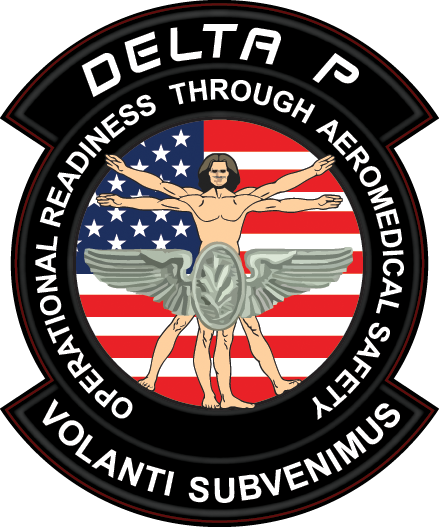
Courses
• Aviation Physiology
• Spatial Disorientation
• Stress (external and self-imposed) and Decision Making
• Hypoxia/Hyperventilation
• Myalgia (back/neck pain)
• Energy Drinks and Supplements
• Hearing Loss Mitigation
• Fatigue/Sleep Deprivation
• Aeromedical Aspects of Accident Investigation
• Age
• Human Factors in Aviation and Accident Investigation
• Laser Strike Protection
• Respiratory and Circulatory Issues of Flight
• Water Survival
• Staying Fit to Fly
• Aviation LIfe Support Equipment (ALSE)
• Pressure Equalization Difficulties
• Decompression Sickness
• Extreme Temperatures
• Advanced Technology-Induced Motion Sickness
• Medical Aspects of Accident Investigation
• Crew Resource Management


Many of our courses (above) are also available online in partnership with the Helicopter Institute.
By request of customers, Delta P has put together groupings of physiology and human factors courses to target specific issues. Some examples follow, but customized programs can be developed.
Inadvertent IMC – 1 Day
This module is to explain what happens to the pilot if he/she runs into a situation where all visual cues are eliminated. Inadvertent IMC encounters are some of the most demanding, disorienting, and dangerous conditions a pilot can experience. These encounters result in the highest percentage of death from helicopter accidents.
Keeping Crew Flying – 1.5 Days
This module discusses those areas that effect every day operations in a flight crew member’s life. We discuss what the problem areas are and how to mitigate them.
Aviation Physiology – 2 Days
Aerospace physiology is the study of the changes in physiological parameters associated with the aerospace environment. The physical challenges associated with aviation include acceleration, spatial disorientation, nervous system changes, hypoxia, and many more. Finally we will also incorporate practical aspects of human factors into mission preparation to ensure that aviators are aware of the impact of issues like fatigue, stress, nutrition, and circadian rhythms.
Application of Human Factors/Human Performance for Aircraft Mishap Prevention – 3 Days
 The term “human factors” has grown increasingly popular as the aviation world has realized that human error, rather than mechanical failure, underlies most aviation accidents and incidents. If interpreted narrowly, human factors is often considered synonymous with crew resource management (CRM) or maintenance resource management (MRM). However, it is much broader in both its knowledge base and scope. In aviation, human factors is dedicated to better understanding how humans can most safely and efficiently be integrated with the technology and operations, and how all of this can prevent mishaps. This course will cover those topics relevant to operations including Human Factors, Human Error, Spatial Disorientation, Situational Awareness, Stress, Decision, and more.
The term “human factors” has grown increasingly popular as the aviation world has realized that human error, rather than mechanical failure, underlies most aviation accidents and incidents. If interpreted narrowly, human factors is often considered synonymous with crew resource management (CRM) or maintenance resource management (MRM). However, it is much broader in both its knowledge base and scope. In aviation, human factors is dedicated to better understanding how humans can most safely and efficiently be integrated with the technology and operations, and how all of this can prevent mishaps. This course will cover those topics relevant to operations including Human Factors, Human Error, Spatial Disorientation, Situational Awareness, Stress, Decision, and more.
Becoming a Crew Member – 2.5 Days
This module creates the foundation from which an individual becomes a functioning crew member.
Public Safety Diving Medical Responder – 4 Days
The focus of the Public Safety Diving Medical Response (PSDMR) course is to train fire, police and SAR medics in responding to diving accidents, treating the patient on the way to the hospital or chamber, and function as an inside-tender if the need arises.
The course will be half classroom and half field work. Part of the field work will be exercises in diver extrication, examinations, equipment preparation, and patient transport.
Our courses (above) are available at the Helicopter Institute or on-site. Helicopter Institute
About Us

